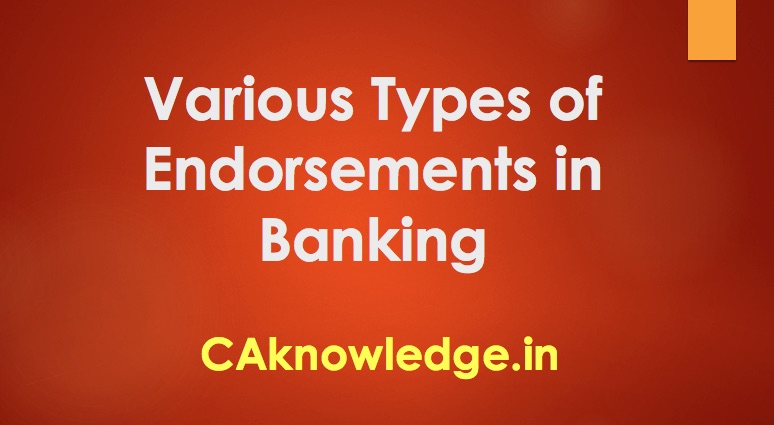Types of Endorsements, When we are studying about negotiable instruments, we need to study about the various types of endorsements as per The Negotiable Instruments Act. So, let us have a look on the type of endorsements: An endorsement may be (a) Blank or General, (b) Special or Full, (c) Restrictive, (d) Partial and (e) Conditional or Qualified.
Quick Links
Various Types of Endorsements
Let us study each of these in a little more detail:
Blank or General:
An endorsement is to be blank or general where the endorser merely writes his signature on the back of the instrument, and the instrument so endorsed becomes payable to bearer, even though originally it was payable to order. Thus, where bill is payable to “Sohan or order”, and he writes on its back “Sohan”, it is an endorsement in blank by Sohan and the property in the bill can pass by mere delivery, as long as the endorsement continues to be a blank
Special or Full:
If the endorser signs his name and adds a direction to pay the amount mentioned in the instrument to, or to the order of a specified person, the endorsement is said to be special or in full. A bill made payable to Sohan or Sohan or order, and endorsed “pay to the order of Sohan” would be specially endorsed and Sohan endorses it further. A blank endorsement can be turned into a special one by the addition of an order making the bill payable to the transferee.
Restrictive:
An endorsement is restrictive which prohibits or restricts the further negotiation of an instrument. Examples of restrictive endorsement: “Pay A only” or “Pay A for my use” or “Pay A on account of B” or “Pay A or order for collection”.
Partial:
An endorsement partial is one which purports to transfer to the endorsee, a part only of the amount payable on the instrument. A partial endorsement does not operate as negotiation of the instrument. A holds a bill for Rs. 1,000 and endorses it as “Pay B or order Rs. 500”. The endorsement is partial and invalid.
Conditional or qualified:
An endorsement is conditional or qualified which limits the liability of the endorser. An endorser may limit his liability in any of the following ways:
(i) By sans recourse endorsement, that is, by making it clear that he does not incur the liability of an endorser to the endorsee or subsequent holders and they should not look to him in case of dishonor of instrument. The endorser excludes his liability by adding the words “sans recourse” or “without recourse”, e.g., “pay A or order same recourse”.
(ii) By making his liability depending upon happening of a specified event which may never happen, e.g., the holder of a bill may endorse it thus: “Pay A or order on his marrying B”. In such a case, the endorser will not be liable until A marries B.
These are the various types of endorsements which help us to decide the negotiability of an instrument.
Recommended Articles
- Balance enquiry number of all Banks
- Types of loans
- Bank Holidays in India
- Sukanya Samriddhi Yojana
- Sovereign Gold Bond Scheme
- Sukanya Samridhi Yojana
- Post Office Monthly Income Scheme Account
- Senior citizens savings scheme
- Jan Aushadhi Scheme
- Revised interest rates for Small Savings Schemes
- National Pension Scheme
- Pradhan Mantri Mudra Yojana


Hello! Will you please answer my 3 queries….
1) Please elaborate who is “B” in restrictive endorsement ….
2) In 2nd context of conditional/qualified opinion :- is it a valid case.. As i think a negotiable instrument must be unconditional….
3) Sans Fraise endorsement is missing please explain that also…
Please do reply…????